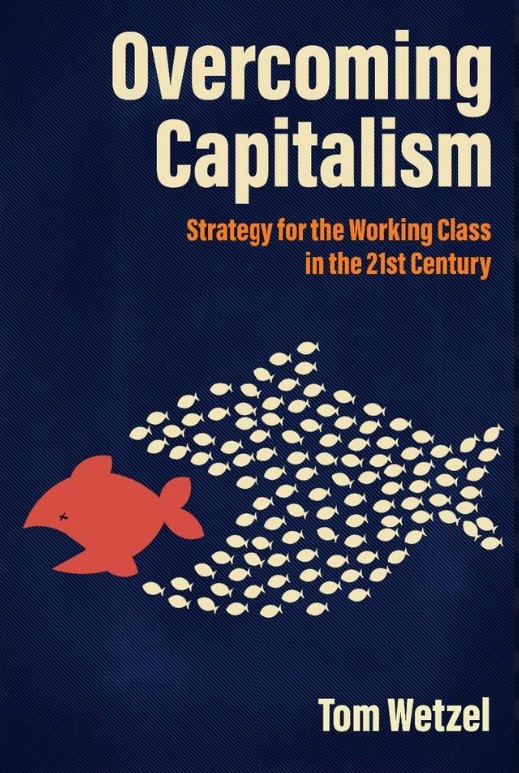The following is a review of Overcoming Capitalism at Anarchist Studies:
Tom Wetzel, Overcoming Capitalism: Strategy for the Working Class in the 21st Century
Chico: AK Press, 2022, 411 pp; ISBN 97818499354707
Anarchism, as is well known, emerged out of the international socialist movement of the nineteenth century. In both theory and practice, it is and always has been an anti-capitalist movement fundamentally characterized by its unwavering and unapologetic opposition to economic exploitation in all forms, and there is certainly no shortage of anarchist writings that enumerate and defend the under-lying reasons for this opposition. What is far less common, at least in the present, are clear and compelling discussions of what anarchist alternatives to capitalism might look like, let alone how to make such alternatives a reality. To the comparatively limited extent that such discussions exist at all, moreover, they tend to rely on ideas from earlier eras which, whatever their other merits, were developed in response to forms of capitalism that (by and large) no longer exist.
There is, accordingly, a desperate need for fresh analyses of how anarchists should, or at least might, resist capitalist oppression in the twenty-first century, no less than what their ultimate end game might be for doing so. Few writers are better equipped to address this need than Tom Wetzel, a veteran writer and activist with more than four decades of experience in the libertarian socialist movement. As one of the founding figures of the Workers Solidarity Alliance in the 1980s, Wetzel contributed significantly to reviving the tradition of antiauthoritarian syndicalism at a time when it had all but vanished from the political scene. Since then, he has played a key role in advancing explicitly socialist and syndicalist currents within American anarchism, a movement hitherto dominated by various post-left tendencies. In one form or other, everything from the resurrection of the Industrial Workers of the World to the emergence of the Black Rose Anarchist Federation bears witness to his influence.
Needless to say, Wetzel does not disappoint. In just over four hundred pages – all of them packed with razor-sharp analysis and penetrating but accessibly written prose – Overcoming Capitalism manages to make one of the most significant contributions to the anarchist canon in more than half a century, if not longer. I realize that this is a supremely bold claim, especially for an inveterate critic such as I, but I believe there are very good reasons to be offered in support of it.
Overcoming Capitalism is notable for consistently and effectively circumventing all manner of blind spots that bedevil contemporary anarchist writings, not least the presupposition of a broadly sympathetic audience with a high degree of already-existing background knowledge. Wetzel does not treat ‘the case against capitalism’ as self-evident; he does not assume that his readers already agree with him, nor that they come ready equipped with the ‘basic understanding’ of capitalism that such a case requires (p7). Wetzel starts from a blank slate, building his case carefully and meticulously from the ground up. In the course of doing so, moreover, he avoids the lamentable tendency toward mere parroting of ‘classical anarchist’ thinkers, providing fresh expositions and justifications of a wide range of fundamental anarchist and syndicalist commitments that have for too long been treated as dogmas and articles of faith.
Even among the so-called ‘classical anarchists’, who had an obvious interest in distinguishing their views from those of Marx and other authoritarian socialists, one finds a not-uncommon tendency to frame critical analyses of capitalism and its attendant problems in essentially Marxist terms. Far from diminishing with the passage of time, this tendency has, if anything, become even more pronounced among anarchist writers, as evidenced by contemporary anarchist theory’s outsized reliance on Marxists like Deleuze, Negri, Camatte, and Bordiga, among many others. Wetzel bucks this trend, too, reserving some of his most astute and trenchant criticism for all manner of Marxist theoretical frameworks, including those with which contemporary anarchists (including Wetzel’s fellow libertarian socialists and syndicalists are all too eager to flirt). This is particularly evident in his discussions of electoralism (chapter 8), bureaucratic unionism (chapter 9), and Leninism (chapter 10).
Though well-executed and fruitful, these theoretical interventions are only a small part of what makes Overcoming Capitalism such an important text. As Wetzel notes, ‘a plausible politics for replacing the capitalist regime requires realistic ideas about the methods of action and organization that could build a social movement with the real capacity to transform society’ (p153, emphasis mine). In my view, the greatest virtue of this text is its unremitting focus on formulating and critically evaluating such ideas – an aim which, though obviously crucial for anarchist thought, has tended to wither on the vine in recent years. Though Wetzel ultimately argues on behalf of broadly syndicalist strategies, he does not so in a way that self-consciously avoids atavism and revolutionary nostalgia. On the contrary, Wetzel acknowledges that such time-honoured tactics need to be adapted to the political, social, and economic realities of the present.
Nathan Jun, John Carroll University

